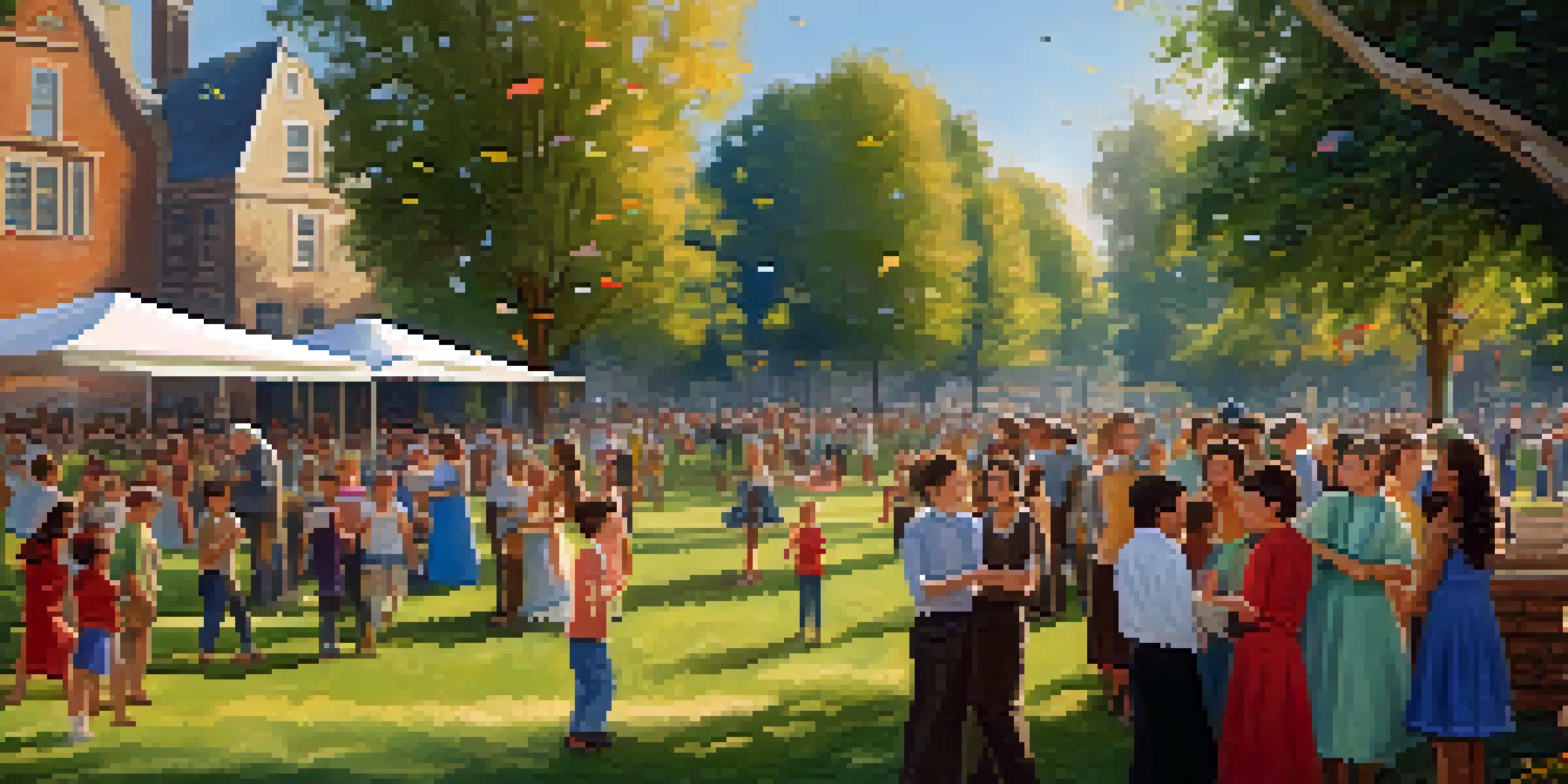The Role of Music in Jewish Spiritual Traditions

Music as a Spiritual Connector in Judaism
In Jewish tradition, music serves as a vital connector to the divine. It enhances prayer and deepens the spiritual experience, creating an atmosphere that encourages introspection and connection with God. Whether through ancient chants or modern melodies, music evokes emotions that words alone often cannot express.
Music is the shorthand of emotion.
For example, the use of the Shofar, a ram's horn, during Rosh Hashanah transcends mere sound; it symbolizes awakening and renewal. The notes resonate deeply within the community, inviting reflection and a sense of shared purpose. This illustrates how music can bridge the gap between the sacred and the everyday.
Music also plays a crucial role during significant life events, such as weddings and bar/bat mitzvahs, where melodies enhance the joy of the occasion. These musical elements not only celebrate personal milestones but also reinforce communal bonds, making the experience even more memorable.
The Role of Chanting in Jewish Prayer
Chanting is a fundamental aspect of Jewish prayer, with its roots deeply embedded in tradition. The melodic recitation of prayers, known as 'davening,' transforms mere words into a spiritual journey, engaging both the heart and mind. This practice fosters a sense of unity among worshippers, elevating the collective experience.

For instance, the 'Kaddish' is often chanted in memory of loved ones, providing solace to mourners while creating a shared space for grief and remembrance. The rhythm and melody of the chant have a profound way of drawing people together in their shared sorrow, illustrating the healing power of music.
Music Connects the Divine
In Jewish tradition, music enhances prayer and fosters a deep spiritual connection to God.
Furthermore, different communities have their unique melodies and styles, reflecting the diversity within Jewish traditions. This variety enriches the spiritual experience, allowing individuals to connect with their heritage while fostering a deep sense of belonging.
Music in Jewish Festivals and Holidays
Jewish festivals are vibrant celebrations where music plays a central role, enhancing the festive atmosphere. During holidays like Passover, songs such as 'Dayenu' and 'Chad Gadya' not only recount the historical significance but also engage families in joyful participation. Music transforms these occasions into communal experiences filled with joy and meaning.
Where words fail, music speaks.
Additionally, during Hanukkah, the lighting of the menorah is often accompanied by songs like 'Maoz Tzur.' This tradition elevates the celebration, reminding participants of the miracles that have shaped their history. The act of singing together reinforces unity and shared identity.
Moreover, music becomes a tool for storytelling, passing down traditions and values from generation to generation. This oral history preserves the cultural essence of the Jewish people, ensuring that each new generation has a connection to their past through song.
The Impact of Jewish Folk Music
Jewish folk music serves as a reflection of the community's history and experiences. It blends elements from various cultures, showcasing the adaptability and resilience of the Jewish spirit. Songs like 'Hava Nagila' have become synonymous with celebration, inviting everyone to join in the festivities.
These folk songs often tell stories of joy, sorrow, and hope, creating a tapestry of emotions that resonate with listeners. The melodies can evoke nostalgia while also fostering a sense of pride in Jewish heritage, making them timeless treasures.
Chanting Unites Worshippers
Chanting, or 'davening,' transforms prayers into a collective spiritual journey, promoting unity among worshippers.
Through community gatherings and celebrations, folk music continues to thrive, connecting people across generations. This living tradition keeps the Jewish cultural identity vibrant and relevant, emphasizing the importance of music in preserving communal bonds.
The Influence of Contemporary Jewish Music
In recent years, contemporary Jewish music has emerged as a powerful force in spiritual expression. Artists blend traditional melodies with modern genres, creating a dynamic sound that resonates with younger generations. This fusion not only keeps the music fresh but also engages a broader audience in spiritual practices.
For example, artists like Matisyahu and Neshama Carlebach have gained popularity by incorporating elements of reggae and pop into their music. Their songs often reflect Jewish themes while appealing to contemporary sensibilities, making spirituality accessible and relatable.
This evolution of music within the Jewish community highlights how tradition can adapt and thrive in modern contexts. It encourages individuals to explore their spirituality in new and exciting ways, fostering a rich dialogue between past and present.
The Healing Power of Music in Jewish Life
Music holds therapeutic qualities that can aid in healing, particularly within the Jewish community. Various studies have shown that music can reduce stress, alleviate anxiety, and even enhance emotional well-being. This makes it an invaluable tool during times of crisis or mourning.
For instance, during shiva, the mourning period, music can provide comfort and solace to grieving families. Songs that evoke memories of the deceased can create a space for healing, allowing individuals to process their emotions in a communal setting. The act of singing together also fosters support and connection among mourners.
Folk Music Preserves Culture
Jewish folk music reflects community history and fosters a sense of pride and connection across generations.
Moreover, music therapy has gained recognition within Jewish settings, providing structured methods for healing through musical engagement. This approach emphasizes the timeless belief that music can uplift the spirit and foster resilience in the face of life's challenges.
The Future of Music in Jewish Spiritual Practices
As society evolves, so too does the role of music in Jewish spiritual practices. The integration of technology and social media has transformed how music is shared and experienced, making it more accessible to a global audience. This shift opens up new avenues for engagement and participation.
Virtual concerts and online prayer services have emerged, allowing individuals to connect with their spirituality from anywhere in the world. This not only broadens the reach of Jewish music but also fosters a sense of global community, transcending geographical boundaries.

Looking ahead, the future of music in Jewish traditions promises to be vibrant and diverse. As new artists emerge and creative collaborations take shape, the spiritual landscape will continue to be enriched, ensuring that music remains a cornerstone of Jewish life for generations to come.